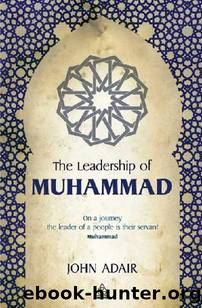The Leadership of Muhammad by John Adair

Author:John Adair [Adair, John]
Language: eng
Format: epub
Publisher: Kogan Page
Published: 2010-07-03T00:00:00+00:00
KEY POINTS
All humankind has passed â or is passing â through a period when the dominant institution of society is the tribe. This fact has given us innate preferences for certain characteristics in our leaders. We expect them, if they are to fulfil the generic role of leader, to be both competent and benevolent.
In the harsh conditions of Arabia it was necessary for leaders and followers to live and work together side by side. Therefore leadership was never hierarchical. A leader was among the people, not over them.
Ancestral leaders acquired their office and authority only with the approval of the people. If not elected by a show of hands or a secret ballot â as is the custom in modern democracies â they were still chosen from a number of eligible candidates.
Tribes needed to have one chief who was known to be the man in charge, the one with the chief authority. The principle of âunity of commandâ is universal. An Arab proverb expresses it starkly thus: The ship that has two captains will sink.
No tribe ever knowingly chooses a man who is known to be morally bad to be its leader.
To ancient peoples, then, it was unthinkable that there should be no leaders. To be without leaders, to obey no one, is unworthy of man: it is to be like the animals, declares an old proverbial saying from Vietnam. Muhammad was insistent that there should always be a recognized leader, though oddly enough he failed to appoint a successor. Perhaps he trusted his companions to make the right choice.
Download
This site does not store any files on its server. We only index and link to content provided by other sites. Please contact the content providers to delete copyright contents if any and email us, we'll remove relevant links or contents immediately.
Time Management Made Easy: How to Cultivate New Habits, Improve Productivity and Get Things Done by Joshua Strachan(2419)
The 7 Habits of Highly Effective People by Stephen R. Covey & Sean Covey(2269)
The Concise Laws of Human Nature by Robert Greene(1917)
Doesn't Hurt to Ask by Trey Gowdy(1641)
Primal Leadership by Daniel Goleman(1286)
Hook Point: How to Stand Out in a 3-Second World by Brendan Kane(1250)
Don't Sweat the Small Stuff...and It's All Small Stuff by Richard Carlson(1123)
The Power of 100! by Shaun King(1100)
HBR's 10 Must Reads 2021 by unknow(1099)
Amazon Unbound by Brad Stone(1047)
100 Things Successful People Do by Nigel Cumberland(1031)
Master of One by Jordan Raynor(1008)
HBR's 10 Must Reads 2021 by Harvard Business Review(1008)
The Job Closer by Steve Dalton(996)
Declutter Your Mind: A step by step guide to learn to control your thoughts, stop worrying, relieve anxiety and eliminate panic attacks and negative thinking by Mia Chandler(971)
Lives of the Stoics by Ryan Holiday & Stephen Hanselman(970)
Conflicted by Ian Leslie(873)
The Book of Hope by Jane Goodall(873)
Coders at Work: Reflections on the craft of programming by Peter Seibel(848)
